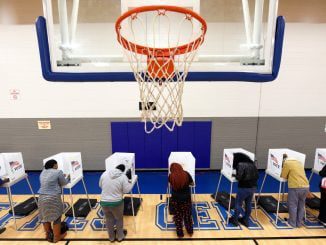WASHINGTON, D.C. — A key Democratic senator says he will not vote for the largest overhaul of U.S. election law in at least a generation, leaving no plausible path forward for legislation that his party and the White House have portrayed as crucial for their agenda.
“Voting and election reform that is done in a partisan manner will all but ensure partisan divisions continue to deepen,” Sen. Joe Manchin of West Virginia wrote in a home-state newspaper, the Charleston Gazette-Mail.
He wrote that failure to bring together both parties on voting legislation would “risk further dividing and destroying the republic we swore to protect and defend as elected officials.”
The bill would restrict so-called partisan gerrymandering of congressional districts, strike down election integrity reforms and increase public financing of political campaigns. Among dozens of other provisions, it would require states to offer 15 days of early voting and allow no-excuse absentee balloting.
Democrats have pushed the legislation to give the federal government greater power in state elections. Senate Majority Leader Chuck Schumer, D-N.Y., has pledged to bring the election bill to a vote the week of June 21, testing where senators stand. But without Manchin’s support, the bill has no chance of advancing. Republicans are united against it.
In appearances on two Sunday news shows, Manchin stressed his reasons for opposing the bill, including his view that it is too broad.
“I think it’s the wrong piece of legislation to bring our country together and unite our country and I’m not supporting that because I think it would divide us further,” Manchin said. He also said he believes Republicans will see the need for a bipartisan deal.
“And if they think they’re going to win by subverting and oppressing people from voting, they’re going to lose. I assure you they will lose,” he said.
Manchin said lawmakers should instead focus their energies on revitalizing the landmark Voting Rights Act, which was partially struck down by a Supreme Court decision in 2013.
Manchin’s opposition to the broader elections bill is just the latest challenge facing Democrats as they debate how to deliver their promises to their increasingly far-left voters. Manchin reiterated he would not vote to “weaken or eliminate the filibuster,” a route that many Democrats want to push forward. The filibuster rule requires 60 votes to pass most bills, and in today’s Senate, which is split 50-50, that means many of the Democrats’ biggest priorities are dead on arrival.
Manchin and Sen. Kyrsten Sinema, D-Ariz., have frustrated their party by their defense of the filibuster. But they aren’t alone, with as many as 10 Democratic senators also reluctant to change the rules.
President Joe Biden seemed to call out Manchin and Sinema for stalling action on voting measures, though he has not said he wants to end the filibuster.
Biden said the right to vote was “precious” and must be protected, and pledged that June would be a “month of action” on Capitol Hill. “We’re not giving up,” Biden said. “I’m going to fight like heck with every tool at my disposal for its passage.”
Senate Republican leader Mitch McConnell of Kentucky has promised to block the elections bill, which he characterizes as undue government overreach into state election systems. He said no GOP senators support it.
“I believe that partisan voting legislation will destroy the already weakening binds of our democracy, and for that reason, I will vote against the For the People Act,” Manchin wrote. “Furthermore, I will not vote to weaken or eliminate the filibuster.”
In March, House Democrats passed the voting bill by a near party-line 220-210 vote. The measure has been a priority for Democrats since they won their House majority in 2018.




